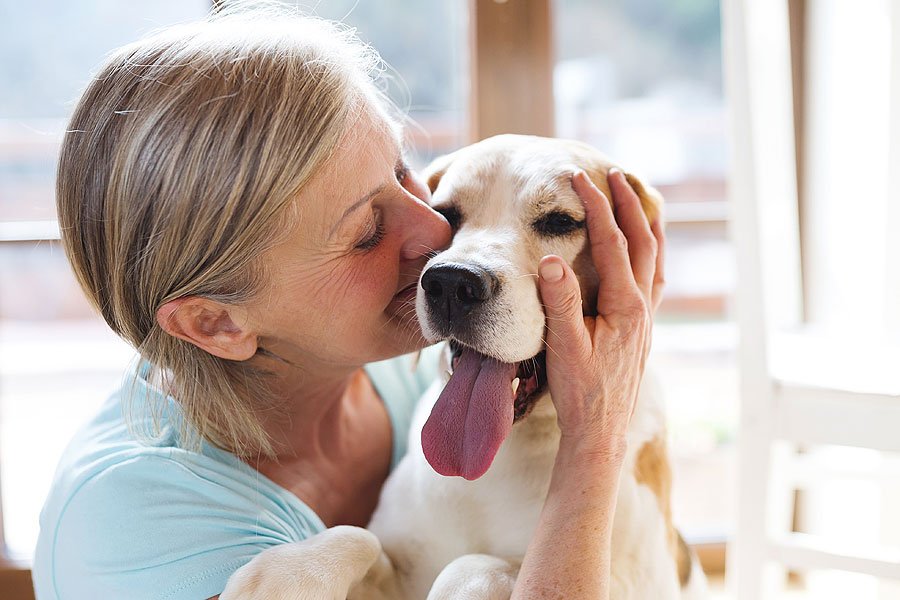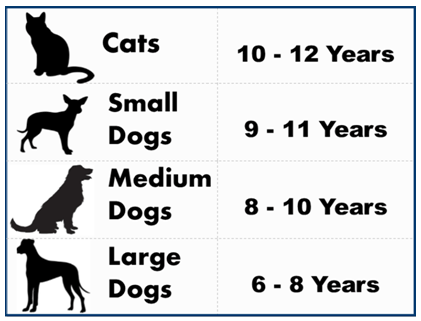
“Everybody loves puppies but older dogs love everybody.” It’s so true! And while we all know that puppies can be a lot of work – older pets also require more time, love and devotion. Most pets are considered “senior” before they show symptoms of being old, such as going gray and becoming achy. Therefore, prevention is your best line of offense in ensuring your pet lives a long and full life! Here are some things to keep in mind and tips for how to care for a senior pet.
How to tell if your pet is a senior pet

We fall in love with our pets from the day we bring them home and sometimes we don’t see what is right in front of us – our pets are aging! While the aging process looks different for every pet, it is a good idea to think about your pet’s age and develop a plan to prevent health issues that tend to arise as they get older. Use this as a guide to tell if your pet is a senior.
5 symptoms to watch for as a pet ages
As pets age, their bodies go through a variety of changes. Here are a few to be aware of and watch for.
1. Digestion and Metabolism
Just like humans, our pet’s metabolism slows as they age, which can easily lead to unwanted weight gain. (We can all share their pain.) Digestion also becomes less efficient with age – resulting in diminished nutrient absorption.
2. Decreased Mobility and Arthritis
Have you noticed that your pet isn’t getting around quite as well as he used to? Senior pets often experience joint pain and stiffness. They aren’t just being lazy!
3. Skin and Coat
Skin thins and loses elasticity with age. This often results in a duller, thinner and more brittle coat. This makes our senior friends more susceptible to injury, bug bites and fleas.
4. Immune System
Older pets tend to have a weaker immune system and have a harder time fighting disease and infections.
5. Behavior Change
This one may be the toughest of all to witness and accept. Just as their bodies change, our pet’s minds do too. Their temperament and mood may seem off and they may experience mental confusion. Nobody likes getting old!
4 ways to support your pet in their golden years
The good news is that you can help ensure that your pet enjoys their golden years to the fullest! Pets who receive extra support as seniors have a better quality of life and live longer. And who doesn’t want that? Follow these four tips to help your pet combat these nagging symptoms and make the most of their golden years.
1. Watch Their Waistline
Keeping your pet at a healthy weight has been shown to extend their life up to two years and postpone signs of aging for three years or more. Unfortunately, studies show that over 50% of our pets are overweight. Here is how to tell if your pet is overweight and some tips to help them lose weight!
2. Add Digestive Enzymes
Even if you are already feeding your pet a healthy diet, they may not be getting all the benefits of the food you feed them due to their less effective digestion and slower metabolism. Adding digestive enzymes to every meal ensures that your pet has the enzymes required to properly break down and absorb the nutrients from their food and boost their energy.
3. Increase Joint Support
Supplements like glucosamine and chondroitin work together to rebuild joint cartilage, protect joints from further damage and help increase mobility. Additional ingredients such as MSM, hyaluronic acid and antioxidants provide even more protection. Joint supplements can help prevent joint problems for aging dogs as well as for highly active dogs and large breeds that may be prone to issues.
4. Enlist Essential Fatty Acids
Omega 3 and 6 fatty acids are “essential” because our pets bodies cannot produce them yet they are essential for their health. Fish oil from salmon, pollock or sardines provides the essential nutrients to nourish the skin and coat. In addition, essential fatty acids aid in joint support, protect the brain, help with mood issues such as depression or anxiety, protect heart and kidney health, and help with hairball prevention, too. That’s a lot of bang for your buck!
It is hard to watch our pets age. But knowledge is power and prevention is the best medicine! Don’t wait until your pet shows signs of aging before taking the steps to help them combat the stresses and strains of old age. The tips mentioned above – along with daily exercise – are beneficial for dogs of any age! As Sydney Jeanne Seward said, “Blessed is the person that has earned the love of an old dog.”
Stop by your neighborhood Pet Pros if you’d like to learn more about preventative care. We’d love to help you support your faithful friend as they age.

